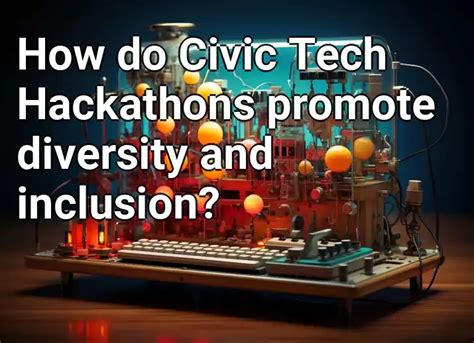In recent years, civic tech has emerged as a powerful force in revolutionizing governance around the world. By leveraging technology, civic tech initiatives aim to increase transparency, participation, and accountability in government. One of the most exciting developments in this space is the civic tech hackathon, which brings together developers, designers, and policymakers to create innovative solutions to pressing governance challenges.

Civic tech hackathons have been held in cities and countries around the world, from the United States to Brazil to Indonesia. These events typically bring together a diverse group of participants, including developers, designers, policymakers, and community leaders. Over the course of several days, teams work together to design and develop innovative solutions to governance challenges, such as improving access to public services, increasing transparency in government spending, or enhancing citizen engagement.
The Power of Collaboration
One of the key benefits of civic tech hackathons is the opportunity for collaboration between different stakeholders. By bringing together developers, designers, and policymakers, these events foster a spirit of collaboration and innovation that can lead to breakthrough solutions. For example, during a recent hackathon in Mexico City, a team of developers and policymakers worked together to create an app that allows citizens to report incidents of corruption and track the progress of investigations.

Innovative Solutions
Civic tech hackathons have led to the development of a wide range of innovative solutions to governance challenges. For example, a team in Brazil created a platform that allows citizens to track the progress of public works projects, such as road construction and public transportation. Another team in the United States developed an app that helps citizens navigate the complex process of voting in local elections.

Benefits of Civic Tech Hackathons
Civic tech hackathons offer a number of benefits, including:
- Increased collaboration between different stakeholders
- Innovative solutions to governance challenges
- Improved transparency and accountability in government
- Enhanced citizen engagement and participation
- Opportunities for policymakers to learn about new technologies and trends

Challenges and Limitations
While civic tech hackathons have the potential to drive significant innovation and change, they also face a number of challenges and limitations. For example, many hackathons struggle to engage a diverse range of participants, particularly from marginalized or underrepresented communities. Additionally, many solutions developed during hackathons may not be sustainable or scalable, particularly if they rely on limited funding or resources.

Best Practices for Civic Tech Hackathons
To ensure the success of civic tech hackathons, organizers should follow a number of best practices, including:
- Engaging a diverse range of participants, particularly from marginalized or underrepresented communities
- Providing clear guidance and support for participants, particularly those who may be new to civic tech or hackathons
- Encouraging collaboration and innovation, particularly through the use of design thinking and user-centered design methodologies
- Ensuring that solutions developed during the hackathon are sustainable and scalable, particularly through the use of open-source technologies and collaborative development models







What is a civic tech hackathon?
+A civic tech hackathon is an event that brings together developers, designers, and policymakers to create innovative solutions to governance challenges.
What are the benefits of civic tech hackathons?
+Civic tech hackathons offer a number of benefits, including increased collaboration between different stakeholders, innovative solutions to governance challenges, and improved transparency and accountability in government.
How can I participate in a civic tech hackathon?
+To participate in a civic tech hackathon, you can search for events in your area and register to attend. Many hackathons also offer opportunities for remote participation, particularly for those who may not be able to attend in person.
